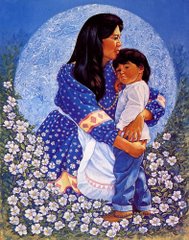How has this impacted you and your family?
Sixties Scoop
http://research2.csci.educ.ubc.ca/indigenation/Indian_ReACTions/Indian_ReACTions/SixtiesScoop.htm
“The Sixties Scoop” is a term that refers to the phenomenon, beginning in the 1960s and carrying on until the 1980s, of unusually high numbers of children apprehended from their native families and fostered or adopted out, usually into white families. While the authorities of the time considered these apprehensions “to be in the best interest of the child,” adult adoptees have articulated their sense of loss:
loss of their cultural identity;
lost contact with their birth families;
barred access from medical histories; and
for status Indian children, loss of their status.
Many aboriginal activists have considered this movement to be another example of “colonization in action.” First the previous generation suffered through the devastation of the residential school experience, graduating with an inadequate education, which ill-prepared them for success in the workplace. Raised in institutional care, many lost the chance to learn parenting skills and many, having to deal with the emotional effects of the abuses they suffered as children, resorted to alcohol and substance abuse. As well, aboriginal people, including Métis, non-status Indians, and those few who eluded the residential schools, faced racism. Those increasing numbers of aboriginal people who, after the Second World War, moved to urban areas, did not benefit from the prosperity of the time. Those who did follow culturally appropriate ways of raising children found their parenting styles misunderstood and unvalued by non-aboriginal social workers.
It was not until 1983 that Patrick Johnston, author of Native Children and the Child Welfare System, coined the term “the Sixties Scoop" In the second chapter of this book he cites the shift from the mid 1950s when less than one percent of children in care in different provinces across the country were of Indian ancestry, to the mid 1960s when children of aboriginal ancestry accounted for a third.
While “the Sixties Scoop” was not legislated by the Indian Act, it was a phenomenon that emerged because of it. Because the Indian Act defined status Indians as wards of the state, or, in effect, children, it encouraged a paternalistic attitude on the part of the Canadian State toward the entire aboriginal community. The rise of the welfare state in post-war Canada reinforced this attitude of paternalism and institutionalized interventionist programs. Aboriginal people, already devastated by a century of colonialist policies, were particularly vulnerable to this assault on their families.
Beatrice Culleton Mosionier’s In Search of April Raintree is about two Métis sisters raised in the foster system. Released in 1985 by a small publishing house, this book found unprecedented success as one of the first and still famous examples of writing about the Sixties Scoop. Other works, including Richard Wagamese’s novel, Keeper’n Me (1994), and Suzanne Fournier and Ernie Crey’s study entitled Stolen from Our Embrace (1997) have discussed the effects of apprehension by the State. These works suggest that through the telling of these stories, “stolen children” can find their way home again.
Subscribe to:
Post Comments (Atom)

No comments:
Post a Comment